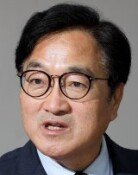[Opinion] Dong-A Ilbo Story Did Not Promote Koreas Partition
[Opinion] Dong-A Ilbo Story Did Not Promote Koreas Partition
Posted December. 30, 2005 03:21,
On New Years eve in 1945, an anti-trusteeship rally was held in Dongdaemun Stadium in Seoul. Almost all shops in the downtown Seoul were closed and a huge crowd gathered there. The anti-trusteeship movement was not manipulated by anybody, left or right. It was totally spontaneous, testified minister Kang Won-yong (88).
On December 28 of the same year, foreign ministers of the U.S., the U.K. and the Soviet Union met in Moscow to decide to put Korea, which had been newly liberated from the Japanese colonial rule, under a joint trust.
The decision greatly grieved Koreans who were overjoyed at liberation and longing for sovereign independence. The overwhelming majority of them were opposed to the trusteeship.
A day earlier on December 27, Dong-A Ilbo reported that the issue of Koreas independence would be discussed at the three ministers meeting in Moscow, that the Soviet Union suggested trusteeship but the U.S. supported immediate independence, citing an overseas report from Washington.
On the same day, the Chosun Ilbo and the Seoul Shinmun reported the same article. It later turned out that the position of the two countries were different from what was reported by the overseas press. However, it was unavoidable for the Korean press to pay attention to it, as the news about trusteeship was already delivered to Korea two months earlier, and because the anti-trusteeship movement was budding.
In December 2003, Media Focus, a KBS weekly media review program made an issue of the 1945 report by Dong-A Ilbo, saying the article aggravated the anti-trusteeship movement and eventually led to the division of the Korean Peninsula.
Why is KBS making it sound like Dong-A Ilbo alone published the news? The argument that the newspaper article led to national division is far-fetched.
Right after the news about trusteeship were conveyed to Koreans, rightists and leftists objected to the decision together. The left took a sudden turn toward pro-trusteeship in January 1946.
On December 30, 1945, Romanenko, the head of the USSR army in North Korea, gave orders to the Korean Communist Party after receiving an order from the Soviet Union to follow the decision of the three foreign ministers meeting. Right after that moment, the leftists in South Korea made an about-face.
Considering the circumstances, it is not too much to say that the division of Korea was brought about by leftists. The historical analysis by Media Focus contradicts the view that finds the legitimacy of the Republic of Korea government in the anti-trusteeship movement. That is exactly why some criticize KBS, a public broadcasting company, for undermining national identity.
Hong Chan-sik, Editorial Writer, chansik@donga.com






